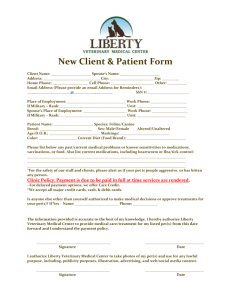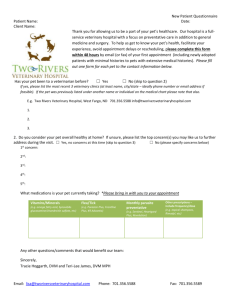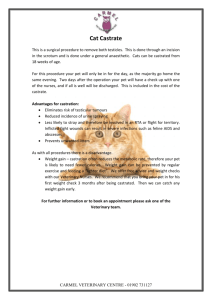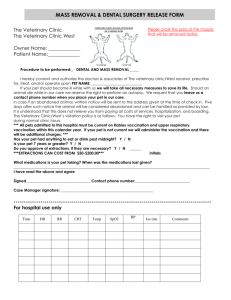A Stress Free Visit - Bluffton Veterinary Hospital and Pet Care Center
advertisement
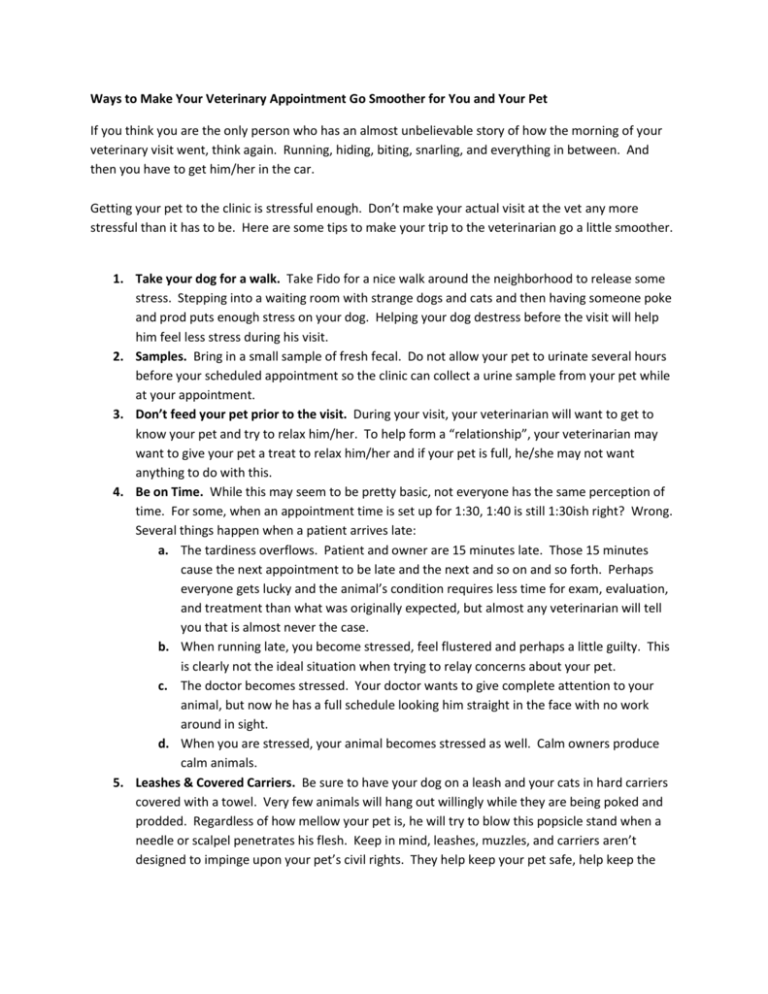
Ways to Make Your Veterinary Appointment Go Smoother for You and Your Pet If you think you are the only person who has an almost unbelievable story of how the morning of your veterinary visit went, think again. Running, hiding, biting, snarling, and everything in between. And then you have to get him/her in the car. Getting your pet to the clinic is stressful enough. Don’t make your actual visit at the vet any more stressful than it has to be. Here are some tips to make your trip to the veterinarian go a little smoother. 1. Take your dog for a walk. Take Fido for a nice walk around the neighborhood to release some stress. Stepping into a waiting room with strange dogs and cats and then having someone poke and prod puts enough stress on your dog. Helping your dog destress before the visit will help him feel less stress during his visit. 2. Samples. Bring in a small sample of fresh fecal. Do not allow your pet to urinate several hours before your scheduled appointment so the clinic can collect a urine sample from your pet while at your appointment. 3. Don’t feed your pet prior to the visit. During your visit, your veterinarian will want to get to know your pet and try to relax him/her. To help form a “relationship”, your veterinarian may want to give your pet a treat to relax him/her and if your pet is full, he/she may not want anything to do with this. 4. Be on Time. While this may seem to be pretty basic, not everyone has the same perception of time. For some, when an appointment time is set up for 1:30, 1:40 is still 1:30ish right? Wrong. Several things happen when a patient arrives late: a. The tardiness overflows. Patient and owner are 15 minutes late. Those 15 minutes cause the next appointment to be late and the next and so on and so forth. Perhaps everyone gets lucky and the animal’s condition requires less time for exam, evaluation, and treatment than what was originally expected, but almost any veterinarian will tell you that is almost never the case. b. When running late, you become stressed, feel flustered and perhaps a little guilty. This is clearly not the ideal situation when trying to relay concerns about your pet. c. The doctor becomes stressed. Your doctor wants to give complete attention to your animal, but now he has a full schedule looking him straight in the face with no work around in sight. d. When you are stressed, your animal becomes stressed as well. Calm owners produce calm animals. 5. Leashes & Covered Carriers. Be sure to have your dog on a leash and your cats in hard carriers covered with a towel. Very few animals will hang out willingly while they are being poked and prodded. Regardless of how mellow your pet is, he will try to blow this popsicle stand when a needle or scalpel penetrates his flesh. Keep in mind, leashes, muzzles, and carriers aren’t designed to impinge upon your pet’s civil rights. They help keep your pet safe, help keep the 6. 7. 8. 9. 10. 11. 12. doctors and technicians safe, help keep other animals and property safe, and keep everything running smoothly. Previous Veterinary Records. If you are seeking a second opinion or this is your pet’s first visit to the practice, be sure to bring his/her records with you. Vaccine Records. If vaccines are given by the breeder, a vaccine clinic, or some other place other than your veterinary clinic, you will want to be sure your veterinarian has all of this on record. Poisoning. If you suspect poisoning, bring the package and labeling of the suspected ingested substance or a sample of the plant if you suspect a plant toxin. Write it Down. Prior to your visit, be sure to write down any questions or concerns you may want to be addressed prior to the end of your veterinary visit. Your questions are more likely to be answered if you ask them. Listen to the Answers. Be sure to listen to the doctor when he is answering your questions. If you have a cell phone, put it on vibrate so you aren’t distracted. Veterinary medicine can be a little complicated and there is a lot of grey area. Listen to the whole answer and ask questions. Perhaps even ask the doctor to put it in writing, especially if you have memory issues, you have children with you, or have multiple animals with you on your visit. Be the Caregiver. Your pet’s care doesn’t stop after you leave the clinic. While our care here at the clinic is important, aftercare can be even more so. Your pet may have medication he needs to take, and/or may have some restrictions. Your pet’s best shot at a timely and full recovery lies in your ability to follow the instructions set by the doctor. Everyone has a role. Please remember that everyone here at the clinic plays a certain role in the care of your animal but his/her knowledge may be limited on what you are asking. A technician is not legally permitted to diagnose a patient or to fill a prescription. Only your veterinarian can do that. The front desk people are trained to answer the phone and make appointments, not restrain your animal.


